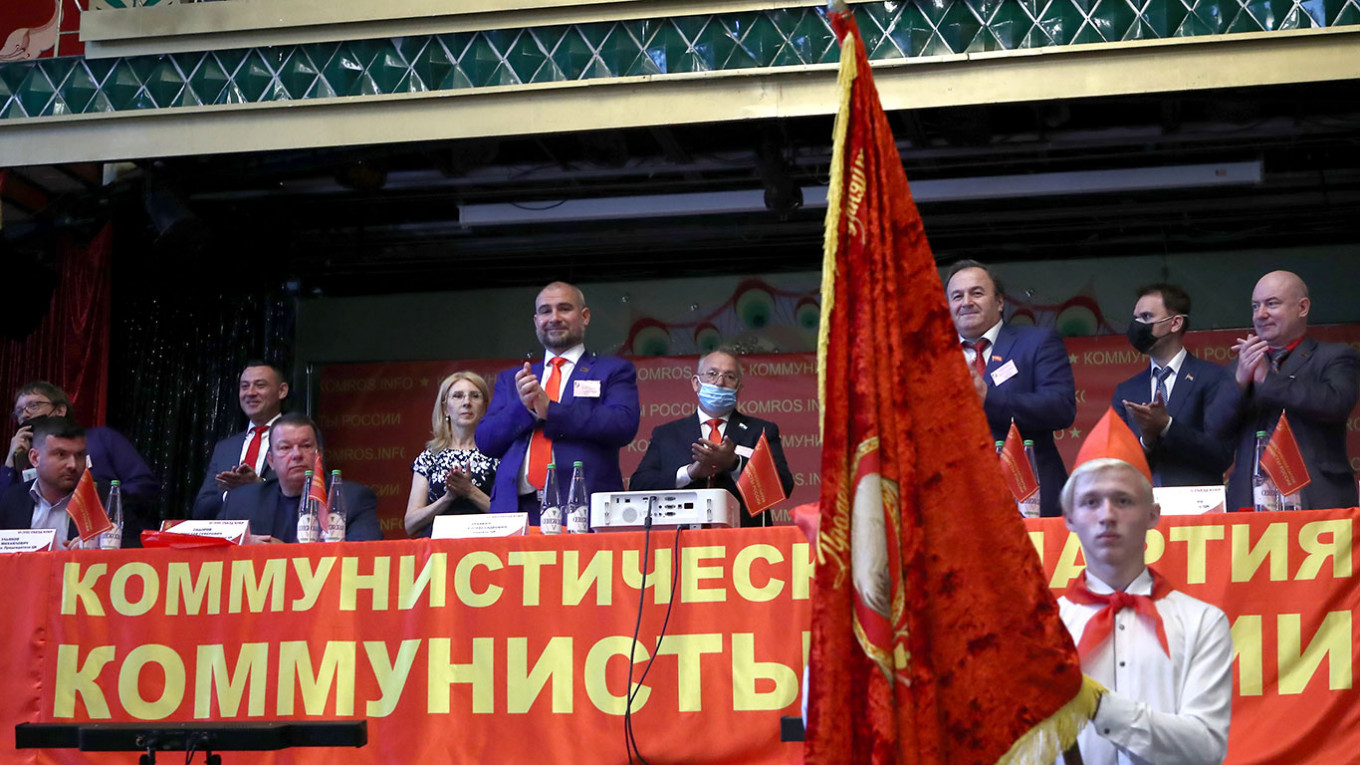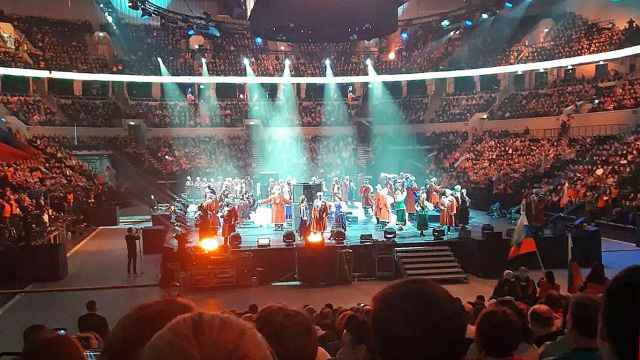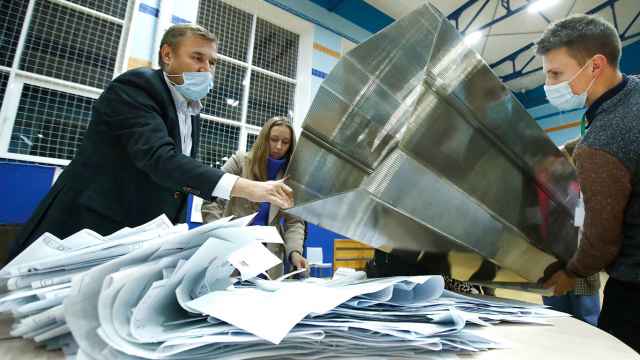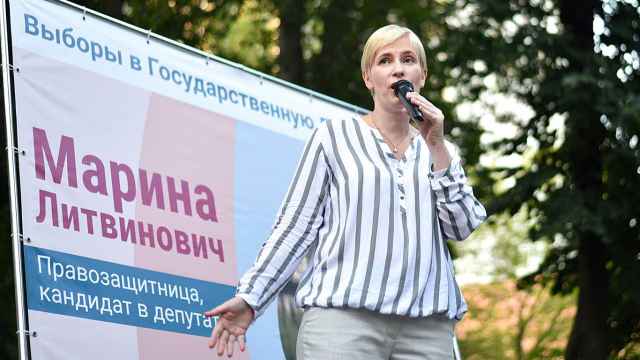This weekend, Muscovites hoping to vote for Communist Party (KPRF) candidates in elections to Russia’s State Duma will have to be careful to tick the right box.
In the Russian capital, KPRF candidates Vitaly Petrov, Nikolai Volkov and Anastasia Udaltsova will run against Vasily Petrov, Alexei Volkov and Anna Udalova, all from the much smaller Communists of Russia party.
For KPRF members and political analysts alike, this is less a series of wildly improbable coincidences than a deliberate bid to jeopardize the party’s electoral chances, even if the alleged culprits maintain their innocence.
“Calling us a spoiler, well, that’s a very subjective thing to say,” said Communists of Russia deputy leader Sergei Malinkovich, a burly, shaven-headed man who wears a golden pin in the shape of an AK-47 assault rifle in his red tie.
“We could just as well say the KPRF is a spoiler for us.”
With the ruling United Russia’s polling lackluster and the KPRF on the upswing, spoilers — parties and candidates using misleading names or campaigning techniques to befuddle voters into backing the wrong party — have appeared all over Russia throughout this campaign.
It has been an election season full of the dirty tricks and so-called “black PR” that have long characterized Russian democracy.
In July, only months after his release from prison, Viktor Mokhov — a notorious convicted rapist and kidnapper widely known as the “Skopinsky Maniac” — released a video endorsement of Russia’s Communist Party, in which he wore a baseball cap and t-shirt bearing the party’s logo and praised its leader, Gennady Zyuganov, as “strong and tough.”
That same month, a video allegedly depicting a group of gay men voicing support for the far-right Liberal Democratic Party began circulating online.
One of the most high-profile cases appeared in St. Petersburg, where Boris Vishnevsky, a veteran opposition member of the city council, found himself opposed by two other candidates with the same name.
It later emerged that the two additional Boris Vishnevskys — who are only distinguishable from the original by their patronymics — had grown beards and simulated the liberal lawmaker’s balding pate in the candidate portraits that are printed on ballot papers, apparently to confuse voters.
Though Central Electoral Commission chairwoman Ella Pamfilova denounced the two new Vishnevskys, and promised to propose a ban on such candidacies, spoiler candidates are far from new, and have a long and dishonorable history in Russian politics.
Potent tool
Under Russia’s election rules, whereby one half of the Duma is elected in first-past-the-post constituencies and the other according to a proportional system, spoiler parties can be a potent tool for the Kremlin.
Ballots cast for parties that draw less than five percent of the vote — the threshold for winning seats in parliament — are redistributed and counted in favor of the largest faction, which is all but guaranteed to be the Kremlin’s United Russia despite the party hitting historic polling lows of less than 30%.
“It’s hard to pin down the precise impact of spoiler candidates,” said Ben Noble, a lecturer in Russian politics at University College London.
“But these methods are used repeatedly across all levels of elections and are costly, so someone must think it worthwhile.”
Election rules that effectively incentivize the authorities to create as many niche parties as possible have prompted a flowering of spoilers, as Kremlin strategists experiment with new grouplets that might indirectly prop up the ruling bloc.
Of the fourteen parties permitted to run for this year’s Duma election, only four have realistic shots of making it into parliament. Most of the rest are more-or-less-explicit spoilers, aimed either at leaching votes from the larger opposition parties, or at attracting “wasted” votes that can then be counted towards United Russia’s total.
Ranging from the Greens — which the Kremlin reportedly attempted to “buy” from its longtime leader for 30 million rubles ($413,000) earlier this year — to the Green Alternative, and from the pro-business Party of Growth and Civic Platform, Russia’s patchwork of spoilers caters to a wide spectrum of ideological tastes.
Very few, however, will ever admit to actually being spoilers.
“Discerning voters have never considered, and do not consider, our party a spoiler,” said Vladimir Burakov, leader of the Pensioners’ Party, a Kremlin-loyal faction that has drifted in and out of existence since the late 1990s, never attracting more than a few percent of the vote.
“We are entirely independent and original,” added Burakov, himself a former official in the Presidential Administration, the Kremlin department that coordinates domestic politics.
Other spoilers appear to be almost surgically targeted against specific Kremlin foes.
Founded in 2012, the Communists of Russia portrays itself as a purist Stalinist party, with principled, ideological differences with the more mainstream Communist Party.
Even so, the party’s penchants for campaigning under KPRF logos, suing to have KPRF candidates removed from ballots, and selecting candidates with similar names to KPRF’s have led to a widespread belief that it is a spoiler targeting Russia’s largest opposition party.
In 2020, founding party member Konstantin Zhukov announced his resignation from the Communists of Russia, accusing its leader of accepting money from the Kremlin in return for running anti-KPRF spoiler candidates.
This year, in seven of Moscow’s 15 districts, the Communists of Russia have put forward candidates with similar or identical names to KPRF contenders.
When interviewed by The Moscow Times, deputy leader Malinkovich acknowledged that his party’s candidates have a habit of sharing names with their KPRF rivals, but denied knowing why.
“That does happen, yes. But not often, and only in two or three regions. It’s difficult for me to talk about it. It’s a question for the local organizations, they’re the ones who choose the candidates.”
“Anyway, look at the district where I’m running,” he added. “The KPRF candidate’s name is nothing like mine.”
Real opposition
On occasion, even spoiler parties can tip over into real opposition, or at least something resembling it.
Earlier this year, Maxim Shevchenko — a charismatic, high-profile media personality — was named the new head of the Russian Party of Justice and Freedom (RPSJ).
Founded a decade ago by Kremlin-linked political strategists as the Communist Party of Social Justice, the RPSJ long traded on its erstwhile Russian-language acronym, KPSS, which it conveniently shared with the old Communist Party of the Soviet Union.
Now rebranded, the party has pivoted rhetorically towards the radical opposition under Shevchenko, who was arrested at a protest against the jailing of Kremlin-critic Alexei Navalny earlier this year.
At otherwise-staid TV debates, the fiery Shevchenko has attracted attention for demanding Navalny’s release, and calling attention to the plight of political prisoners in Russia and Belarus.
For opposition supporters, however, Shevchenko — who they argue could not have filed for office without the Kremlin’s say-so — is a plant by the authorities to draw pro-Navalny voters away from the Communists.
“How could we possibly be a spoiler?” asked Shevchenko, during a telephone interview with The Moscow Times.
“We’re not imitating anyone else. The views I hold now are the same ones I’ve held all my life.”
Despite his party’s well-documented links to the Kremlin, Shevchenko insists that his bid for office is in good faith, and that his run was not agreed with anyone in advance.
“There were no consultations with the Presidential Administration before launching the campaign,” said Shevchenko.
“At least, none that I’m aware of,” he added, after a short pause.







